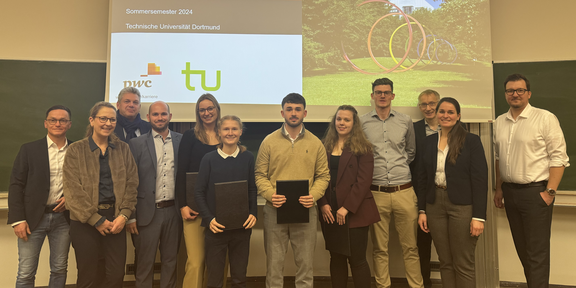PwC award ceremony summer semester 2024

On 3 December 2024, the Faculty of Business Administration and Economics at TU Dortmund University became the scene of excellent academic achievements: At the 32nd PwC Awards Ceremony, the auditing and consulting firm PricewaterhouseCoopers honoured the best theses in the fields of controlling, accounting, auditing and taxation, which impressed with their academic depth in the summer semester of 2024. The event not only offered the prizewinners a stage, but also the opportunity to experience the close connection between science and practice in an exciting guest lecture. Laura Wolbeck's Bachelor's thesis and Timo Lukas Woschko's Master's thesis at the Chair of Management Accounting and Control were honoured. The Chair of International Accounting and Auditing honoured Anna Tautz's Bachelor's thesis and Ilka Rogowski's Master's thesis.
In her Bachelor's thesis, Laura Wolbeck investigated the problems of data collection in sustainability controlling. The thesis was written in collaboration with the waste management company Remondis SE. Specifically, Ms Wolbeck tracked vehicle data in real time in order to analyse diesel consumption. She came to the conclusion that focussing on data collection using digital methods is central to measures to improve sustainability.
In her bachelor's thesis, Anna Tautz analyses the application of the draft standard ED/2021/1 ‘Regulatory Assets and Regulatory Liabilities’ to transmission system operators using the example of Amprion. The focus is on regulatory assets and liabilities that arise due to delays between the provision of services and the settlement of charges and that cannot yet be satisfactorily recognised in the balance sheet under current IFRS regulations. The resulting distorted reflection of the financial performance of transmission system operators is problematic because they are dependent on funds from investors to finance the supra-regional grid expansion as part of the energy transition. International investors in particular use the IFRS financial statements as a basis for weighing up the opportunities and risks of an investment. The draft standard ED/2021/1 addresses the problem described above with a separate accounting model for regulatory items, which is intended to provide a more precise picture of the net assets, financial position and results of operations of price-regulated companies.
In his master's thesis ‘WACC approach in incentive regulation - further development of the cost of capital remuneration with a focus on transmission system operators’, Timo Lukas Woschko analyses the regulatory appropriate transfer of the existing return on capital logic for transmission system operators to a flat-rate total return on capital in accordance with the WACC approach. The work identifies alternative courses of action for the regulatory handling of the components of the cost of capital remuneration affected by the system changeover and defines the premises for a methodologically appropriate determination of the WACC. Finally, recommendations for the conceptual design of the WACC approach are formulated against the background of grid expansion obligations and capital requirements in the context of the energy transition.
Ilka Rogowski's master's thesis deals with the audit of the materiality analysis in the sense of the ‘European Sustainability Reporting Standards’ and shows that the audit of the materiality analysis will remain a dynamic and very relevant topic in the coming years. The profession is currently facing major questions that can only be answered by establishing industry standards. In order to counteract possible challenges with regard to poor data quality and documentation, the auditor should ideally be involved in the preparation of the materiality analysis in order to gain an understanding of the relevant decision-making processes from the outset and to be able to drive forward the standardisation of the audit. Due to its leverage effect and as the centrepiece, the materiality analysis has an extremely important task in reporting, the quality and transparency requirements of which can currently only be guaranteed by an audit by an auditor.
We would like to congratulate the award winners!

